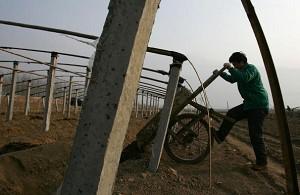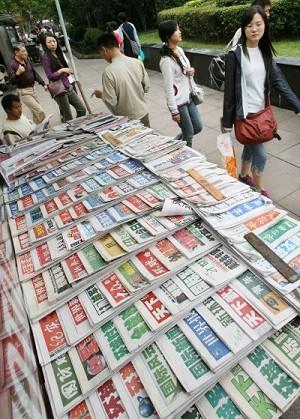Among the 1.3 billion people in China, 900 million are farmers. Independent analysts have noticed that, in many issues that concern farmers’ direct or immediate interests, such as arbitrary levies, organized crime and corruption, the farmers’ voices are faintly, if ever, heard. Thus, today’s Chinese farmers have given people an impression of possessing an incapability of voicing their concerns. This raises the question of how farmers’ rights to speak can be ensured. RFA correspondent An Pei has invited Mr. Yao Lifa, a former people’s congress representative in Qianjiang City in Central China’s Hubei Province and independent areas analyst of rural issues, Mr. Zeng Ning, an independent analyst in Guizhou City in Guizhou Province, for a discussion.
RFA Reporter: I'd like to start with a question for Mr. Yao Lifa of Hubei Province. Farmers’ voices are unheard on many of China’s issues; what’s the cause of this?
Yao Lifa: In my opinion, the first reason is that Chinese people are not allowed to speak. China’s current system does not allow the peasantry to speak out. I’m familiar with many farmers, such as Cui Xianglian of Shandong Province and Yu Lanfang of Hubei Province, who are the best of them, and are leaders of their class. These people tell the truth. Yet after doing so some were sentenced to forced labor camps, some were sentenced to prison, and some were deprived of political rights.
If you speak the truth concerning farmers’ interests, it is very likely or even certain that you will bring yourself disaster. Either the village tyrant, hooligans and local thugs will come to beat you, or the corrupt officials of the Chinese Communist Party (CCP) will find excuses or set traps to drive you to a dead end using any means they can.
The second reason is that nobody listens to you. Among the officials of the basic level organizations of the CCP and other government officials, how many will actually sit down and listen to farmers voice their concerns and injustices? Pretty much no one. If a government official sincerely contacts the farmers and listens to them, it is very likely that this person’s career as an official will end.
These two are the main reasons. We’re not discussing history’s past; the rightists speaking out in 1957 [3], the students speaking out in 1989 [4]. We’re not discussing these. Just talking about the current situation; farmers truly dare not speak the truth.
Reporter: In Mr. Yao Lifa’s opinion, one reason for the peasantry’s silence is that they not allowed to speak, and the other is that nobody listens to them when they do. What is your opinion, Mr. Zeng Ning? In ancient China, there were peasant representatives such as Hong Xiuquan [1] and Feng Yunshan [2]. At that time in many cases rural gentries and scholars would speak on behalf of peasants, but at present it seems we’re quite short of these spokesmen.
Zeng Ning: In today’s Chinese society, the reason why farmers do not have the right to speak and one cannot hear farmers’ voice, and in one word, the farmers are a “silent” community. The fundamental cause of their “silence” is the problem of the current political system—it has fundamentally blocked and suffocated the Chinese farmers’ voice.
Today’s Chinese Communist regime boasts that it properly represents farmers and workers. This being the case, the government and the officials in power believe that what they think and do and their policy are the reflections of farmers’ interests. If this is so, then why would it necessary for the farmers to have their own voice?
Therefore this political system does not allow farmers to have their own voice. It does not allow the existence of farmer representatives such as Mr. Lu Banglie, Mr. Chen Guangcheng, and Mr. Liu Zhengyou who have emerged in recent years in the process of reform and open-door policy, in the development of market economy, and while some private economies have begun to appear in the countryside. They are the spokesmen of farmers who dare to speak and represent their interests, yet these spokesmen are not accepted by the Chinese communist regime and the officials in power, and are often persecuted.
Reporter: Today’s Chinese farmers do not stop in the traditional role of merely working in the farmland. Thousands of farmers have entered the cities and penetrated into each profession. Mr. Yao, according to your observation, how much desire do the farmers have to speak for themselves? How can the silence of modern farmers be broken?”
Yao Lifa: It’s not that they’re unwilling to express their will; in fact, farmers are very willing to express their will. So how can this problem be solved? In my opinion, farmers should first be allowed to assemble or form associations. Today’s farmers do not have the right of assembly, and are therefore dispersed. Ones have no power after being dispersed, fighting alone incurs persecution, and in the end, this leads to a community silenced or incapable of communication.
Another thing is that the origin of the authority for administrative officials, according to the Constitution, should be the people. The present origin of official authority has validity in form, but no validity in essence. In other words the farmers occupy the overwhelming majority of the Chinese national population, but in exercising citizen voting rights they actually failed. The third change, in my opinion, is that China should have a Law on News, only then can farmers’ rights of expression be gradually carried out.
Reporter: Mr. Yao has brought up the issue of farmers’ voting rights. The Chinese media had reported that, in a village in Shanxi Province, some villagers sold their votes for 1,800 yuan (US$225). What’s your opinion on this phenomenon, Mr. Zeng Ning?
Yao Lifa: I haven’t heard of such a situation, but I wouldn’t rule out the possibility. Farmers, as well as other populace, do not have a very strong desire for rights and participation in politics, and are likely to sell their votes to others.
It could also be another situation in which they found participation in politics meaningless and saw politics as being something false and deceptive. Under such circumstances, if they could instead turn it into something more practical, like cash, then why not? I wouldn’t rule out this mentality.
How to ensure Chinese farmers to have their own spokespeople indeed? How to entitle them with true rights of speech? I can think of the following solutions: the first and most important is to conduct a system reform. But under the situation that a system change cannot be made, how will Chinese farmers’ right of speech be ensured as fully as possible? I have the following suggestions. For instance enforce the true respect of law and implementation of law. At present, there are some articles ensuring human rights in the Constitution, and some regulations about farmers’ lawful rights in the countryside related laws and regulations in the Law on Villager Autonomy. But again the problem is, under the current Chinese judicial environment, these simply cannot be implemented.
(Edited based on the recordings of Radio Free Asia)
Note: [1] Hong Xiuquan (1814-1864) was the leader of the Taiping Rebellion (1851-1864) and established the Heavenly Kingdom of Taiping, in which he was known as the Heavenly King.
[2] Feng Yunshan (1832-1862), Chinese missionary and social reformer, was one of the original leaders of the Taiping Rebellion.
[3] The most infamous instance was the persecution of intellectuals in 1957. The CCP called on the intellectuals to offer their opinions, but then persecuted them as “rightists,” using their own speeches as evidence of their “crimes.”
[4] The 1989 Tiananmen Square Protests , often better known as the Tiananmen Square Massacre or June 4th Incident, were a series of student-led, pro-democracy, pro-socialism demonstrations in China, which occurred between April 15, 1989 and June 4, 1989. The protests ended in violence when the 27th Army of the People’s Liberation Army used force to restore order in Beijing, the capital city.

